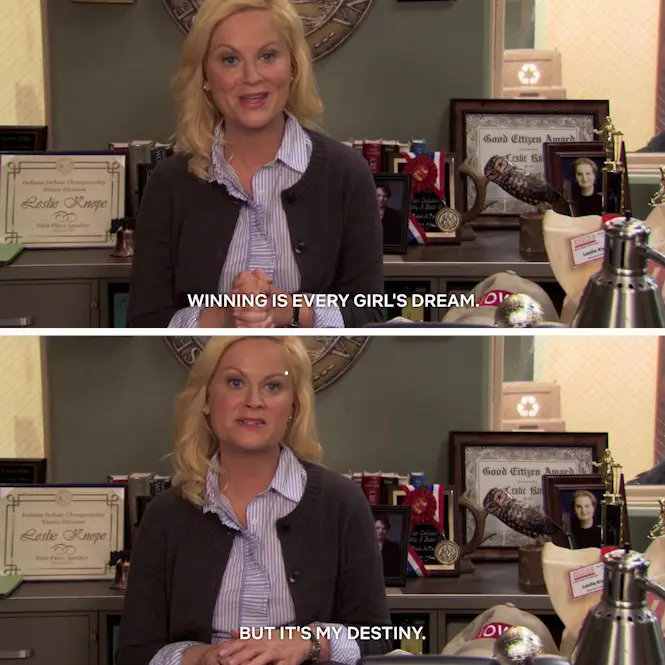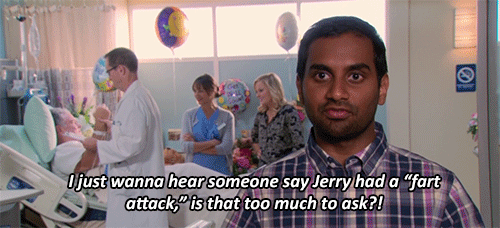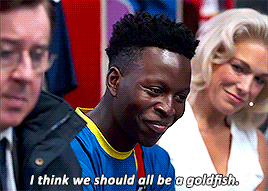(Spoilers for Ted Lasso follow, eventually. Thanks to Drunk Napoleon for letting me take his spot this Monday.)
I generally think the “pessimism of the intellect, optimism of the will” attitude is a good one to have. I’m not a pessimist in the sense that I think the worst will always happen, but I try to keep a realistic grasp of, well, reality, and what I can and can’t do in it and what I can and can’t change. Similarly, my optimism doesn’t come from a sense that it will all work out in the end; if anything, it comes from a certain humility: How can I be so confident as to know I can’t make a difference? How can I be so sure that I should stop trying? I can’t, so I go on.
The “hopepunk” dialogue came and went rather quickly a couple of years ago– and thankfully so, because it feels to me like the opposite of what I’m talking about. “Hopepunk” is not about how you act in the world; it’s about what you consume. It’s the idea that watching shows about nice people– or, more to the point, shows about niceness– makes you a better person, or worse, is some kind of revolutionary act. (“Hopepunk” stands, and was formed, in contrast to “grimdark,” the extreme ethos of the antihero era, where simply being grim, brutal, and morally compromised makes a work “adult” or “mature”– and, in our current era, that means the belief that watching said works also makes you mature.)
I’ve been thinking about three different TV shows recently in this context– one I loved more than I expected; one I loved at first but grew to tire of or even resent in its last few years; and one I have tried more than once to get into and just doesn’t stick. That said, as someone who wants comedy to be funny first and foremost, and rather resents sitcoms that care more about making me feel like I’m hanging out with nice people than being funny, for me the big surprise is that the first one ended up being one of my favorite shows of the year.
If you haven’t guessed, the three shows I’m talking about are Ted Lasso, Parks and Recreation, and Schitt’s Creek. Since I’ve actually seen all of the first two, let’s start there.

If I had to use one word to describe the difference between Ted Lasso‘s optimism and latter day Parks’ optimism (starting in season 5 or so, or maybe even going back to season 4), it would be “effort.” If I had to use five words to describe another difference between the two, it would be “personal success vs. material success.”
In the early days of Parks and Recreation, the stories were smaller, and the struggles occasionally trivial, but when the characters succeeded, those successes were often found through, or achieved in terms of, personal relationships. The growing respect between Ron and Leslie, through episodes like “Hunting Trip,” “Sweetums,” and “Woman of the Year,” is a great example. (“Sweetums,” in fact, is the rare Parks episode where Leslie doesn’t win on the political issue of the day.)
This was true even when the achievement was a material or political one: Think season 3’s “Ron and Tammy: Part Two,” where Leslie has to use the favor from the police chief she intended for security at the Harvest Festival to get Ron out of jail. Ben later approaches him and tells him what Leslie’s real intended favor was: The chief agrees, because of the relationship he and Leslie have built over the years.
As the show shifted, the tone toward the town was increasingly less of a small community that helps each other out when it’s needed, and more towards a core group of noble, wonderful characters who were being held back by a town too stupid to realize their greatness. (A town which, for the record, they still inexplicably thought was the most special place on Earth.) The idea of one of the townspeople being an ally instead of an obstacle became practically unthinkable.

We’ve talked about the ways in which Parks’ tone shifted in later seasons many times on here– especially Miller‘s excellent observation, tying into the former paragraph, that the show at some point stopped satirizing bureaucracy and started satirizing democracy– but another way I wanted to highlight is that the characters’ success increasingly became defined only in material terms, something that became really obvious in the final season. For just one example, Tom finally opens a successful restaurant and it actually leads to him becoming a worldwide mogul like he always wanted. As Grace Robertson puts it in her great essay:
This was repeated among many of the other characters, where the audience would be told of their accomplishments without ever really presenting the sense that they had to work for it. Andy tried his hand at being a children’s entertainer and quickly became the best at it in Southern Indiana. Ron started a building company that had huge, overnight success.
All these success aren’t about personal growth or influencing the people around them; they’re money- and career-based, no more so than Leslie and Ben, whose primary triumphs are based in how far they advance in the federal government (the finale heavily implies that at least one of them has become President of the United States). Even when characters find love and pair off (which essentially everyone who isn’t married before the series– i.e. everyone except Jerry– does by the end), it often comes across as though a guest character was written for them solely for that purpose.
Robertson highlights another problem with latter-day Parks and Rec here, harkening back to that first difference I mentioned: There is no sense of effort or struggle behind these successes. If you are a main Parks cast member, simply wanting to succeed at something is enough to have success– it requires no effort, no personal growth, no lessons learned. For any talk about Parks characters being aspirational, they don’t really seem to have to put much effort that we see into anything to succeed at it. They don’t really seem to grow much as people, with a couple of exceptions: April and Andy’s story, two immature people of opposite personalities whose feelings and relationship bring out the best in one another, is still one of my favorite odd-couple romances on TV– at least before they, too, decide they’re not complete without children. (Strange how much Parks defines succeeding in life by not only career ambitions but by forming a traditional nuclear family. For such a supposedly nice show, it seemingly has a very narrow view of what constitutes a life of value. Nice People have highly lucrative careers, get married, and have children.)
As Robertson puts it, “Parks would rather reward the people it liked for being pure of heart than show the practical realities of governing or accomplishing things,” and that does not warm my heart, certainly not when I don’t find said purity of heart to actually be the case.
That latter point speaks to another problem with the later years, that the show is a niceness show rather than a kindness show. Niceness is an affect, a mode of behavior and manner of speaking. Kindness is how you actually treat other people:
Niceness is saying "I'm so sorry you're cold," while kindness may be "Ugh, you've said that five times, here's a sweater!" Kindness is addressing the need, regardless of tone.
— Jordan is on break until April (@jordonaut) January 21, 2021
Sometimes kindness means holding people accountable and confronting them about their behavior. Parks in the later years rarely did this– it’s not a coincidence that the character most willing to put his foot down, as said foot was actually planted in reality, was written out after two seasons. Even in earlier seasons, characters like Tom got away with selfish or sociopathic behavior with little more than a light reprimand, if that. Even when the behavior had serious consequences for other people, like in season 4’s “Meet N’ Greet,” the onus was often still on the victim– Leslie, in this case– to make the effort to patch things up. This got worse in later years; in something like “Animal Control,” Leslie’s nepotism and favoritism is treated as a virtue, while Councilman Jamm’s is treated as a vice. The implication here is one of Leslie’s supremacy justifying her actions, not a nice or kind value at all.
Niceness can often be superficial, and like many superficial values, discarded when it’s no longer convenient. The way the rest of the main cast treated Jerry is a perfect example; their disregard for him and pranks got more and more cruel with time, even as he did nothing to deserve it beyond the occasional gaffe or minor work screwup. (Strangely, season 2’s “Park Safety” addressed this well, back when the issue was only more standard workplace bullying– somehow the bullying got worse after the events of “Park Safety.”) Comparing how the main cast treated Jerry– a screwup but a basically decent person– to how they treated Tom– who often knowingly engaged in reprehensible behavior and rarely learned from it– is really jarring and shows how superficial “niceness” can be.

Ted Lasso is not a niceness show, but it is a kindness show. Unlike Parks and Rec and its characters being handed success without struggle, Ted Lasso shows Ted’s kindness and optimism as a process. It requires not only the ability to see the good in other people, but the will to: the patience, persistence, reliability, and consistency it takes from Ted to win people over and bring out the best in them, and the fortitude to keep going even when people don’t buy in immediately, or when, say, the whole town has taken to referring to you as “wanker.” Ted’s gestures can range from simple (bringing Rebecca biscuits every day) to dramatic (pulling Jamie Tartt from a game after he scores two goals because he refuses to pass), but the end goal is the same: bringing out the best in the people around him, both personally and professionally. (The variety of Ted’s tactics speaks to another reason his optimism works; he’s open-minded and willing to adapt to his new circumstances and what they require of him. And, of course, Ted’s interest in people for their own sake both fuels his drive to bring out the best in them and keeps him inquisitive and attentive enough to figure out which of their buttons to push.)
Ted Lasso works in this fashion because it’s steady and plausible, not only in the character of Ted but in the plotting: Nothing happens overnight; it’s all a gradual process that happens as people slowly realize what Ted is about– and, for that matter, that he’s not naïve or foolish but has a lot more backbone than any Pollyannaish description would suggest. His interactions with Rupert Mannion, Rebecca’s ex-husband and a billionaire playboy whose charm masks his malevolence, show this: He knows right away who Rupert is and that he has no shot of changing him, so he works to protect Rebecca and the club from him. Here is another difference from Parks, where niceness was often parceled out based on your standing in the cast (a literal caste system!) rather than whether or how your actions merited it.
Ted’s effort to be kind and consistent and bring out the best in others is not only a struggle, but a hard-fought one that doesn’t end in triumph: The season ends on a downer note, with the team losing at the last second to Manchester City and thus being relegated, but thanks to Ted’s influence, the people around him have grown and he’s even become a fairly capable coach. He has Rebecca’s buyin; Roy Kent has stepped up to be the veteran leader Ted needs; he’s gotten wallflower Nate, the equipment manager, to start speaking up and has found his knowledge so valuable he promotes him to assistant coach. He’s even influenced Jamie Tartt, since recalled to Man City: The game-winning goal comes because Tartt successfully breaks away and, like Ted was trying to get him to do during his time with Richmond, makes the extra pass instead of going for glory himself. (Ted sends him a hand-written note after seeing Jamie’s father berate him afterward: “WAY TO MAKE THAT EXTRA PASS. TED“) And Ted himself has realized that, as much as his goal as a college football coach was to mold young men, he’s dealing with professionals now, and he needs to be willing to put what’s best for the team on the field ahead of his players’ feelings, without losing his principles.
In a strange way, that struggle makes Ted Lasso aspirational, another thing I don’t particularly think sitcoms need to be but yet works here. I won’t ever be President of the United States or a worldwide mogul or even a successful children’s entertainer, but even if I wanted to, I certainly couldn’t do it just by wanting it enough– I don’t have the cheat code of being a Michael Schur character, and as I mentioned earlier, there’s no process to any of those characters’ successes. (If Schur wrote Ted Lasso, Rebecca would have been on Ted’s side by the second day he was in Richmond.) I won’t ever be a football coach, either, but I can strive to be a little more kind, a little more generous, a little more patient, and a little more reliable– and then I can be a little more than that the next day. And like Ted, I can do it without sacrificing my backbone or the strength it takes to stand up for myself, or without sacrificing my grip on reality. And that may not win any championships, but maybe it’ll make me a better person and improve my relationships with the people around me, and maybe it’ll influence them to be better as well.

I think that’s part of why I have trouble getting into Schitt’s Creek. I’ve watched six episodes; the major drawback for me is that it’s just not as funny as I would like. (I can think of two comic setpieces I really enjoyed; I feel I should re-emphasize that Ted Lasso is very funny.) Beyond that, though, the ways in which people praise the show and say it gets better don’t particularly appeal to me: Beyond not wanting to go through twenty more episodes before a show “gets good in season 3,” the ways in which it gets better apparently have more to do with the heartwarming aspects than the comedy. Given my experiences with Parks, I’m going to be suspicious of any show that’s sold to me based on its niceness. Besides, I just don’t find anything particularly compelling or, to reiterate, aspirational about spoiled rich people having to learn to be marginally decent so they can become rich again. I’m already marginally decent, and there’s been no shortage of shows about rich people being forced to learn how to be marginally decent or shows where we can laugh at clueless rich people’s foibles. (Why wouldn’t I just go watch Arrested Development instead?) Now, none of this is to say I hate Schitt’s Creek or even disliked what I saw; it just never really rose above the level of “occasionally pleasant and occasionally humorous” for me, certainly nothing that compelled or inspired me.
Again, Ted Lasso surprised me in this regard, because I don’t need aspirational figures in my comedy, but when done well, they are genuinely inspiring. Unlike the superhumans of Parks or the spoiled rich of Schitt’s Creek, Ted is a kinder, more patient person than I am, but not in a way that’s unrealistic or out of my reach, and that’s portrayed in a way that shows the real effort and persistence it takes to live that way. Strange, indeed, to find myself loving a comedy where I look up to the characters more than I look down (or more accurately, askance) at them.
Ted Lasso manages to work in a field– the sitcom about the power of kindness and optimism– I usually don’t care for, but like period dramas or prog-rock, it’s a field that if it hits, can make something truly special (like “Roundabout” by Yes). There’s something about the veracity of Ted Lasso, the honesty of its portrayal, that being kind and generous is in fact hard work and takes a lot of patience and persistence, that really resonates with me. It may be hard work, but it can be done, by any of us, and we don’t need to have the proper status on the right TV show to do it. To me, that’s more truly optimistic than a hundred shows about nice people being nice to each other.


